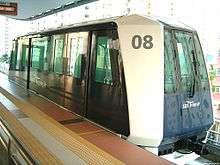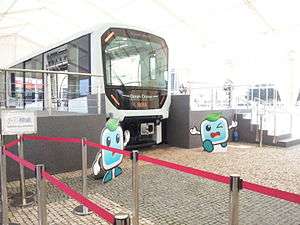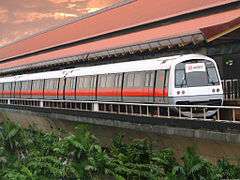Crystal Mover
The Crystal Mover is a rubber-tired automated people mover (APM) system for airport and light rail applications manufactured by Mitsubishi Heavy Industries in Mihara, Japan. The Crystal Mover is based on the Japanese APM standard, used in six Japanese automated guideway transit systems including the Yurikamome and the Rokko Island Line.[1]

Public transport
Singapore
In Singapore, Crystal Movers operate between the Sengkang LRT line and the Punggol LRT line, operated by SBS Transit Ltd. These cars have been operating since 2003 on the Sengkang LRT and on the Punggol LRT since its operation in 2005. There is a fleet of 41 cars of Mitsubishi Heavy Industries Crystal Mover C810 in total for the two LRT lines.[2][3] An additional order was placed for 16 more cars (Contract 810A) with identical specifications to increase capacity on both LRT lines, and had been fully delivered as of 2016.[2]
Airport connections

Crystal Movers are currently in operation in the following airports:
- AeroTrain, Washington Dulles International Airport, United States
- ATL Skytrain, Hartsfield-Jackson Atlanta International Airport, United States
- Changi Airport Skytrain, Singapore Changi Airport, Singapore
- HKIA Automated People Mover, Hong Kong International Airport, Hong Kong
- MIA Mover and Skytrain, Miami International Airport, United States
- Shuttle Train, Incheon International Airport, South Korea
- Terminal 3 APM, Dubai International Airport Terminal 3, UAE (Terminal 1 uses Bombardier Innovia APM 300 instead)
- Orlando International Airport People Movers, Orlando International Airport (C Parking terminal and Gates 1-59 only, Gates 70-129 are served by Bombardier CX100 shuttles)[5]
- Tampa International Airport SkyConnect, United States
Specifications

- Configuration: Single-car or Double-car
- Capacity (passengers): 105 (including 18 seats) or 210 (including 36 seats)
- Vehicle mass (t): 14.9/vehicle
- Vehicle dimensions (mm): 11 840 (length) × 2 690 (width) × 3 615 (height)
- Guide system: Side guide two-axis four-wheel steering system
- Electric system: 750 Volts Direct Current
- Gauge (mm): Gauge, 1 850; guide rail span, 3 200
- Maximum speed
- Vehicle performance: 80 km/h
- Operation: 70 km/h
- Acceleration: 1.0 m/s² (3.6 km/h/s)
- Deceleration
- Maximum service: 1.0 m/s² (3.6 km/h/s)
- Emergency: 1.3 m/s² (4.7 km/h/s)
- Car body structure: Aluminum alloy welded structure
- Traction motor: Three-phase induction motor, continuous rating 80 kW × 2 units
- Propulsion control system: VVVF inverter vector control (individual control of each axis)
(with variable load control and regenerative brake)
- Brake system: Electric command pneumatic brake with regenerative brake
(with stand-by brake and parking brake) (with variable load control and wheel slide prevention control)
See also
| Wikimedia Commons has media related to Mitsubishi Heavy Industries Crystal Mover. |
- Bombardier Innovia APM 100, a popular competing airport APM
- Bombardier Innovia APM 200, a newer competing airport APM and direct competitor to the Crystal Mover
- Light Rail Transit (Singapore)
- Véhicule Automatique Léger
- Mitsubishi Heavy Industries Crystal Mover C810
- Mitsubishi Heavy Industries Crystal Mover C810A
- Mitsubishi Heavy Industries Crystal Mover (Changi Airport Skytrain)
- Roll way
References
- Mitsubishi Heavy Industries: Automated People Movers Archived 2008-04-11 at the Wayback Machine
- "Mitsubishi Heavy Industries and Mitsubishi Corporation Receive Order for Design, Manufacture, Installation and Commissioning of Singapore Light Rapid Transit Capacity Expansion -- Vehicles and Electrical and Mechanical Systems for Sengkang and Punggol LRT Systems (C810A) --". 22 May 2013. Archived from the original on 4 March 2016. Retrieved 25 November 2015.
- "Mitsubishi Crystal Mover". SGTrains. Retrieved 28 September 2013.
- Mitsubishi wins LRT tender Archived 2011-01-04 at the Wayback Machine
- "Terminal-Gate Shuttle Replacement". Orlando International Airport. Archived from the original on 10 September 2017. Retrieved 7 August 2017.


.jpg)